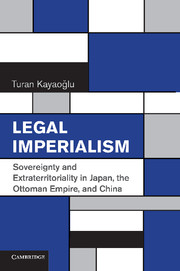Book contents
- Frontmatter
- Contents
- Tables and Figures
- Acknowledgments
- Introduction: Extraterritoriality in British Legal Imperialism
- 1 Positive Law and Sovereignty
- 2 Extraterritoriality and Legal Imperialism
- 3 Japan's Rapid Rise to Sovereignty
- 4 The Ottoman Empire's Elusive Dream of Sovereignty
- 5 China's Struggle for Sovereignty
- Conclusion: American Legal Imperialism – Extraterritoriality Today
- Bibliography
- Index
Conclusion: American Legal Imperialism – Extraterritoriality Today
Published online by Cambridge University Press: 25 May 2010
- Frontmatter
- Contents
- Tables and Figures
- Acknowledgments
- Introduction: Extraterritoriality in British Legal Imperialism
- 1 Positive Law and Sovereignty
- 2 Extraterritoriality and Legal Imperialism
- 3 Japan's Rapid Rise to Sovereignty
- 4 The Ottoman Empire's Elusive Dream of Sovereignty
- 5 China's Struggle for Sovereignty
- Conclusion: American Legal Imperialism – Extraterritoriality Today
- Bibliography
- Index
Summary
Mainly through legal institutionalization, non-Western states secured the abolition of extraterritoriality, achieved their sovereignty on Western foreigners and commercial interest, and integrated themselves into Westphalian international society as formal equals. The Meiji rulers’ legal codification and the spread of the Japanese state court system led to the early abolition of extraterritoriality in Japan in 1899. While the legal reforms of the Ottoman elite failed during the reorganization period, the legal reforms of the Kemalist elite in the early 1920s emerged as a bargain between Turkey and Western states over the abolition of extraterritoriality in the Lausanne Treaty of 1923. The Chinese leaders’ failures to codify rules and consolidate legal authority in the 1920s explain the Western states’ retention of extraterritoriality in pre-Guomindang China. The Guomindang legal reforms in the 1930s and normative change in the United States against extraterritoriality created the conditions for the abolition of extraterritoriality in 1943.
The rise and demise of nineteenth-century extraterritoriality reveal how certain conceptions and practices of law and sovereignty sometimes served the Western imperial interests. The practices of extraterritoriality, however, had some beneficial consequences for non-Western societies, in particular for their reformist elites. These practices stimulated the transformations of indigenous legal systems, speeding their “modernization” and the “positivization” of these legal systems, which bolstered rulers’ claim to legal centralization. By means of imposing extraterritoriality and conditions to end it, Western imperial states spurred non-Western states’ adaptation of positivist legal ideas, categories, and practices. Western demands reflected both the legal positivist worldview prevalent in the West since the early nineteenth century and the belief that legal institutionalization of non-Western states could open new commercial and investment opportunities for Western merchants.
- Type
- Chapter
- Information
- Legal ImperialismSovereignty and Extraterritoriality in Japan, the Ottoman Empire, and China, pp. 191 - 204Publisher: Cambridge University PressPrint publication year: 2010



